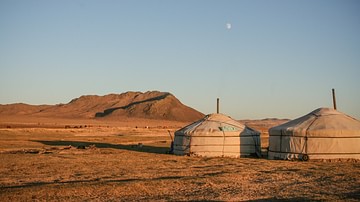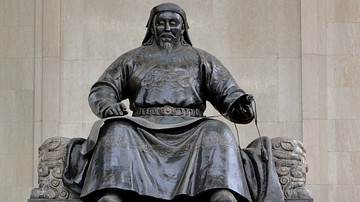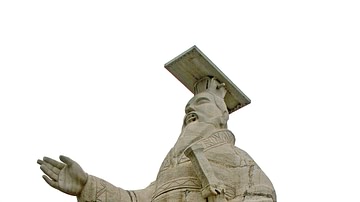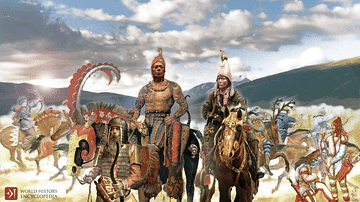Search
Did you mean: Soma?
Summary 
Loading AI-generated summary based on World History Encyclopedia articles ...
Search Results

Video
The Scythians: Nomad Warriors of the Steppe | Barry Cunliffe | Talks at Google
Sir Barry Cunliffe has been Professor of European Archaeology at the University of Oxford for 35 years and is Fellow of the British Academy. In this talk, he discusses his latest book "The Scythians: Nomad Warriors of the Steppe" (Sep. 2019...

Video
The Scythians: Nomad Warriors of the Steppe with Barry Cunliffe
Sir Barry Cunliffe has been Professor of European Archaeology at the University of Oxford for 35 years and is Fellow of the British Academy. In this talk, he discusses his new book "The Scythians: Nomad Warriors of the Steppe", a masterful...

Definition
Yurt
A yurt (ger in Mongolian) is a large circular tent made of wool felt stretched over a wooden frame used by nomadic peoples of the Asian steppe since before written records began. Yurts are especially associated with Mongol herders and hunters...

Image
Scythian Territorial Expanse, c. 700-300 BCE
This map illustrates the westward expansion of the warrior-nomad Scythians between the 7th and 3rd century BCE across Asia and Europe. Originating in the Central Asian steppes, they spread into the Pontic region, shaping regional power dynamics...

Definition
Hellenistic Period
The Hellenistic Period is a part of the Ancient Period for the European and Near Asian space. The use of this period is justified by the extent of the Hellenic culture in most of these areas, due to the Greek political presence especially...

Definition
Amazon Women
In Greek mythology, the Amazons were a race of warlike women noted for their riding skills, courage, and pride, who lived at the outer limits of the known world, sometimes specifically mentioned as the city of Themiskyra on the Black Sea...

Definition
Kublai Khan
Kublai Khan (Qubilai-Qan) was the ruler of the Mongol Empire from 1260 to 1294. His accomplishments include establishing Mongol rule in China under the name of the Yuan Dynasty (1271-1368), thus becoming the first non-Chinese to rule the...

Definition
Shi Huangdi
Shi Huangdi (l.259-210 BCE/r.221-210 BCE, also known as Qin Shi Huang, Qin Shih Huandi, Shi Huangti or Shih Huan-ti) was the first emperor of a unified China. Shi Huangdi means `First Emperor' and is a title, not a proper name. The Qin Dynasty...

Definition
Scythians
The Scythians were a nomadic people whose culture flourished between the 7th and 3rd century BCE in a territory ranging from Thrace in the west, across the steppe of Central Asia, to the Altai Mountains of Mongolia in the east. This covers...

Definition
Gustav Mahler
Gustav Mahler (1860-1911) was an Austrian-Bohemian composer best known for his song-cycles and his grand, sweeping symphonies, which often require expanded orchestras for their full performance. Mahler, a composer of Late-Romantic music and...